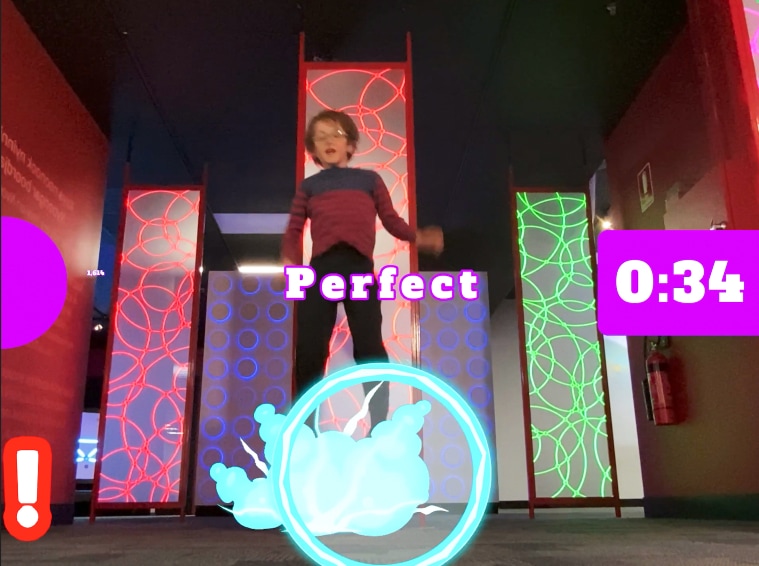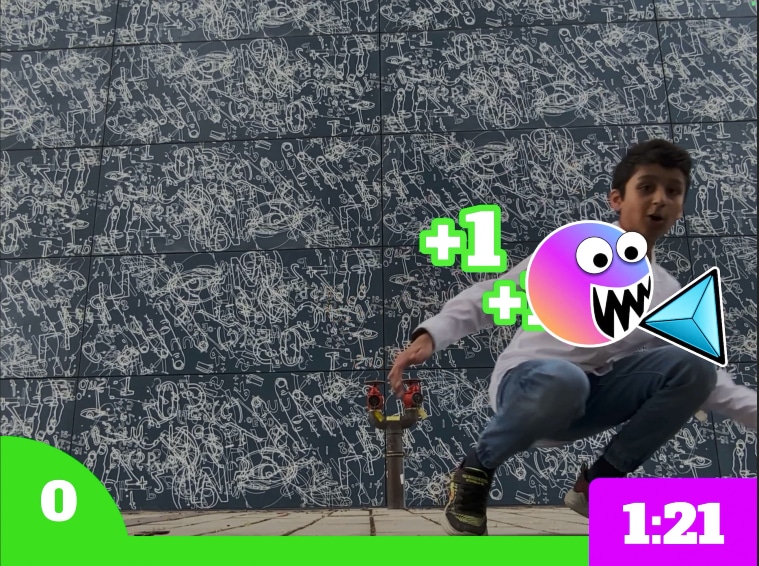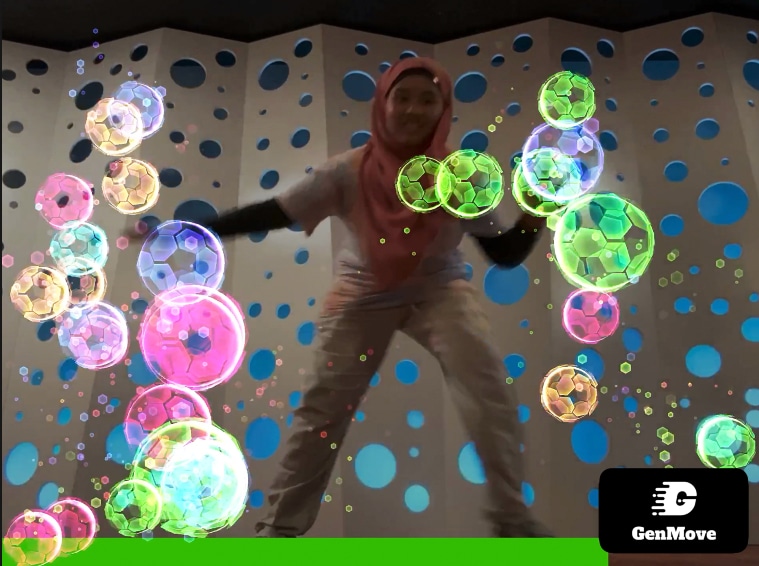When Andrew Hall, the UK-based developer behind GenMove, was developing the app he had thought about creating a solution that lets children exercise in an engaging way without taking their smartphones away from them. That one thought led to the development of GenMove, which encourages kids to get moving either outdoors or in their bedrooms along with their phones they are already so familiar with.
“Maybe in our generation, we chose to go out and get engaged in sports, but today’s kids get it much quicker by engaging with the screen,” Hall told indianexpress.com in a call from Perth, Australia.
Kids not stepping out to play and engage in different kinds of outdoor games is a real concern, even parents admit children of the present generation do not even know what those games were. Instead, kids like to spend hours on virtual spaces like Roblox and Minecraft and their entire “social” life revolves around meeting online friends and getting entertained by video games. Because of this many children spend more time in front of their smartphone screens, skewing their inclination towards physical activities.
GenMove Season 1 will be available for free to every kid with access to a smartphone or tablet. (Image credit: G13R )
Hall said exposure to a smartphone isn’t bad for kids—after all, children born today are digital natives. The solution, he thinks might work for smartphone addiction, is how we manage their screen time. “We got to engage the kids where they want to play which is at the screen, and just don’t tell them it’s very good for them and they don’t even realise they’re exercising,” he said, adding that it’s not that the kids don’t want to exercise, it’s just that they need a more engaging experience. “There’s a lot of commentary coming out now that the movement literacy of the current generation is nowhere near what it was the previous generation, and we think that is due to screen time,” he said.
Capitalising video games
Hall thinks an app like GenMove does change the narrative and offers a solution to children’s excessive screen-time problem. GenMove is not a fitness app in the traditional sense, instead, it capitalises on video games centred around exercise. With GenMove, children can exercise and also play a game, with the app taking advantage of Artificial Intelligence (AI) and Augmented Reality (AR), turning them into a part of the game. This is possible through the selfie camera on their smartphone, which tracks each independent body part in real-time, opening a new way to interact with the objects on the screen.
“You control the game through your body movement. And by looking at the screen, it’s like looking into a mirror and watching yourself interact with these objects on the screen and play a game,” Hall, a former health scientist turned venture capitalist, described the basic premise of GenMove.

There are about 50 games, and their sequence is different each day. Based on one’s performance, they earn a currency to customise their avatar. There are no additional in-app purchases, nothing that people are used to in mobile games. The app is designed to be played 10 minutes per day, equaling a high-impact fitness session without the stress of finding an instructor, appropriate clothing, and leaving the house. “We have gamified exercise,” he said. “We borrowed from some of the most famous titles of yesteryears, and we’ve created a movement game.”
The idea of GenMove came from data and insights that Hall and his team gathered while working on the BALLN app, which uses technologies such as AR and AI to hone footballers’ skills. To Hall’s surprise, engagement on indoor workouts was high during the coronavirus pandemic. The expertise in creating the BALLN app and access to the data helped Hall create the GenMove app. “I think we have developed a kid’s gamified fitness platform by accident. It was kind of this unintended consequence of the pandemic that showed us the pathway of developing the app [GenMove],” he explained.
GenMove Season 1, which is developed in association with the World Health Organization (WHO) and FIFA, is already live on the Apple App Store and Google Play Store. The app had been in development for months and only recently went live during the ongoing FIFA World Cup, which is currently taking place in Qatar.

GenMove is currently live in 130 countries and that number will reach 170 by the end of the month. The app is currently available in English, Arabic, Chinese, French, Russian, and Spanish and soon Hindi will be added. Holland is the most popular market for GenMove, said Hall. The app works on any Android smartphone or iPhone.
‘Overall well-being of parents’
Hall and his team flew down to Qatar in October to test the app on 75 children in the age group of six and 19 of all different shapes and sizes and neurological capabilities, including autistic kids. During a one-week exercise, Hall observed most children who didn’t want to move actually started moving. “Seventy-three of the 75 kids completed the actual session, and we had their physical teachers come up to us and say, we just can’t get these kids moving, the gamified fitness has something in it,” he explained.
Some parents fear that video games might be detrimental to children’s well-being and mental health. To that, Hall said completing a GenMove session is “very different” to “what they [kids] are” after playing a video game. “When we talk about using the screen to get them moving, the parent’s eyes light up and they say this could be the secret weapon because everyone’s so frustrated with their kids sitting on the couch wanting to play video games for hours each day,” he said. Hall added: “I really believe the parents are a really strong ally, but the game needs to be super fun for the kids to play. That’s the approach we are taking because ultimately we will be selling this app [GenMove] as a solution to the overall wellbeing of the parents.”
When GenMove was in development, the biggest concern for Hall and the team was whether children would come back and find these exercises fun and engaging enough. On average, they spend 30 minutes per day on the app.

Future plans
Hall said his team is always working on improving the app and getting the user experience right. “In our beta testing, we realised we had a lot of things wrong, we saw 50 per cent drop offs in places where we thought there would be zero drop off.” Hall pointed out that his company is very data-driven and the team iterates two to three times a week based on data that are coming back from the field.
Right now, GenMove is free to use until FIFA matches are on but once the World Cup ends, Hall said he will start charging for the app. The price is yet to be decided but Hall indicated that GenMove will cost the same as other fitness apps, with the option to free-to-try before users pay for the app.
By early next year, Hall plans to launch a free trial version of season two of GenMove. It will include a multiplayer mode where users can join others and play against the family. The company is planning to add a new avatar interaction mode where a player’s avatar will be part of the experience. The plan is also to include 50 more games but that will take a few months to develop and release to the public.

A big part of its push is enhancing the look and feel of avatars and the ability for the avatar to be with you in the game experience. It all sounds like grand ambitions to build a metaverse, which is described as a virtual world or a space where 3D interactions will be possible. “It’s not that we consciously chose to be in the metaverse. It’s just that where the kids like to engage. So, that’s what we’re building out,” he said.
“We know that the parents don’t like these gaming companies but they still allow their kids to play because the kids have fun. The missing piece for it is this exercise experience and if you can earn more for your avatars through this metaverse interaction, we do see it as part of it. For us, when we think of metaverse, we think of avatar interoperability between games.”